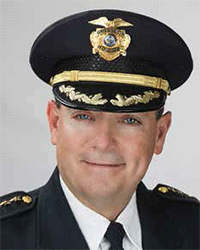 When we made our commitment to the law enforcement profession, we promised to protect and serve our communities. With that duty comes great responsibility and challenges, and our jobs are inherently dangerous. Although we have the great experiences of helping people and seeing justice unfold, we also encounter some of society’s worst members and witness unspeakable things that will be forever burned into our memory.
When we made our commitment to the law enforcement profession, we promised to protect and serve our communities. With that duty comes great responsibility and challenges, and our jobs are inherently dangerous. Although we have the great experiences of helping people and seeing justice unfold, we also encounter some of society’s worst members and witness unspeakable things that will be forever burned into our memory.
While we dedicate our lives to others, we cannot forget about ourselves and our colleagues. It is imperative that we do everything we can to stay safe and mindful of our health. If we don’t make it a priority to keep ourselves healthy and fit – and take every possible precaution to stay safe – we won’t be able to protect our communities or our fellow officers.
To aid you in staying safe and healthy, the IACP has continually made officer safety and wellness its top priority. We developed the IACP Center for Officer Safety and Wellness (the Center) in order to provide policy and procedural guidance, training, and resources for the field. The Center’s resources are for law enforcement officers at all levels from executives to first line supervisors to new recruits. The Center’s resources are designed to assist and inform everyone throughout their career from those in the academy to officers in retirement.
Beginning in January 2015, the Center began releasing monthly line-of-duty death summary reports via email to keep those in the field informed on how and why officers are losing their lives in the United States. We have found that officer fatalities due to gunfire and vehicular incidents continue to tragically account for the majority of deaths of law enforcement personnel. While many of these deaths could not have been prevented, there are some precautions that officers can take to try to avoid injury or death.
For example, the seat belt, a simple but vital piece of safety equipment, is often neglected when officers are rushing to get to a scene. It is imperative that law enforcement officers wear their seat belts and that law enforcement leaders stress the importance of seat belt use within their agencies.
Like seat belts, body armor is equally important to a police officer’s survival and well-being. Enacting a mandatory vest wear policy is only a preliminary step toward protecting officers from needless disabilities or deaths. There’s no denying it – vests save lives!
Policing is a demanding and stressful career; those demands and long hours often cause health to take a back seat. In the first six months of 2015, 11 officers in the United States suffered fatal heart attacks. This six-month figure is set to eclipse the number of fatal heart attacks among officers in all of 2014. The physical health of law enforcement officers is an aspect of wellness that is vitally important. Current IACP resources in this area available to the field include publications on nutrition education and a doctor’s checklist, which encourages officers to visit their physicians regularly and outlines the important questions to ask their physicians. Forthcoming Center resources will focus on the importance of physical fitness and provide guidance on how agencies can build or refine programs so that their officers are physically fit for the rigors of the job.
|
Visit the IACP Center for Officer Safety and Wellness The Center strives to establish a culture of safety, health, and wellness by emphasizing these values as they impact officer performance from recruitment to retirement. New Center resources include: Nutrition Tri-Fold; Nutrition Fact Sheet; Doctor’s Visit Checklist; Police Vulnerabilities Poster; and monthly Line-of-Duty Death Summary Reports. Visit www.theiacp.org/CenterforOfficerSafetyandWellness to learn more. |
Job stress for a law enforcement officer frequently extends beyond his or her hours on the clock. Officers typically see more tragedy in the first few years of their careers than most people see in a lifetime, and the near-constant exposure to human suffering can take its toll on an officer. The mental health of law enforcement officers and the threat of suicide are critical concerns for police leaders and law enforcement agencies. As law enforcement executives, we need to make sure that we create a culture in our agencies that allows officers to feel comfortable speaking out about their emotions and any issues they are having. In addition, we must support our peers. If you think something is troubling your fellow officers, speak to them about it or seek assistance in getting them help. In addition, when you know one of your colleagues is suffering from a traumatic event, be there to support him or her and have an open and candid conversation.
We must remember that officer safety and wellness is imperative, and we must all work together to ensure that we are taking care of not only ourselves, but also our brothers and sisters. Promoting officer safety and wellness often hinges upon leaders leading by example and implementing sound and responsible policies within their departments. Leaders must provide officers with the tools, resources, training, and guidance to most effectively and safely serve their communities on a daily basis.
I hope that you will take some time to utilize the resources available through the Center. Most importantly, stay safe and healthy. ♦
Please cite as
Richard Beary, “Priority One: Officer Safety and Wellness,” President’s Message, The Police Chief 82 (August 2015): 6.


